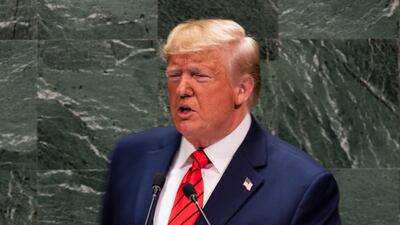In his third speech at the United Nations General Assembly on Tuesday, US President Donald Trump committed to his “America First” anti-globalist message but struck a less bellicose tone on foreign policy without changing course on Iran.
Unlike previous years where he waded into several challenges and potential initiatives in the Middle East, Tuesday’s speech singled out Iran as the main priority for Mr Trump in the region. There was no independent mentions of the wars in Iraq, Syria, Libya, and Yemen and no reference to the Israeli-Palestinian peace process as US efforts in that arena continue to stumble.
Instead, Mr Trump solely focused on Iran. ”One of the greatest security threats facing peace-loving nations today is the repressive regime in Iran," he said.
"The regime's record of death and destruction is well known to us all,” he added, accusing Iran’s leaders of leading a “crusade for riches and personal power” and “squandering the nation's wealth and future in a fanatical quest for nuclear weapons.” But the US president didn’t close the door on diplomacy, saying "America is ready to embrace friendship with all who genuinely seek peace and respect."
The US president tied any lifting of sanctions on Iran to its behaviour. “No responsible government should subsidise Iran’s bloodlust. As long as Iran's menacing behaviour continues, sanctions will not be lifted. They will be tightened,” he said.
While Mr Trump was speaking, the White House sent out talking points reaffirming that the administration “will continue to impose maximum pressure until the regime changes its reckless behaviour”.
But a big part of the speech was addressed to his US electoral base, said Brian Katulis, a senior fellow at the Centre for American Progress. “Trump’s 2019 #UNGA19 speech at times sounded more like a re-election messaging effort than a real foreign policy agenda,” he tweeted.
Mr Katulis told The National that Mr Trump's references to abortion, guns, and religious freedom in the speech made it more "directed at his hard right-wing conservative base in America than the world."
Jonathan Schanzer, senior vice president of research at the Foundation for Defense of Democracies, saw continuity in Mr Trump’s foreign policy themes. “The president is staying on his current course. He’s doubling down on Iran sanctions, he’s asking other countries to pull their weight, and he’s keeping a focus on China.”
Mr Schanzer told The National that Mr Trump's criticism of China in Hong Kong is new, so is his "effort to calm the oil markets in the event of continued attacks on oil facilities [in the Gulf]". Mr Trump declared that the United States is now the largest producer of oil and natural gas in the world.
On the absence of Middle East issues from Mr Trump’s speech, Daniel Shapiro of the Institute for National Security Studies in Tel Aviv, saw it as indicative of his priorities as he prepares to run for a second term in office.
Mr Shapiro who served as a former ambassador to Israel under Barack Obama, told The National that the speech "was far more about the nativist themes of his [Trump's] 2020 re-election campaign than about any particular foreign policy agenda".
“His boilerplate language on Iran and ignoring of the rest of the Middle East should send a clear signal that as he fights impeachment [over Ukraine controversy] and seeks a second term, he will not be looking for new adventures abroad.”
But despite being tough on Iran, Mr Trump wasn’t as strident as he was in the past, said Richard Gowan of International Crisis Group.
“While Trump talked tough on Iran and Venezuela, he was much less bellicose than he was towards North Korea in 2017” when he called its leader “Rocket Man.”
"On Iran in particular he seemed keen to frame resolving the crisis as a multilateral issue. It seemed designed to appeal to the Europeans, who have toughened their language on Iran this week," Mr Gowan told The National.

